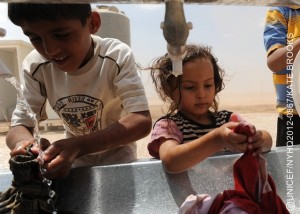Appeal by heads of leading UN humanitarian agencies for the people in Syria
2013-04-16
After more than five million people have been forced to leave their homes, including over a million refugees living in severely stressed neighbouring countries …
After so many families torn apart and communities razed, schools and hospitals wrecked and water systems ruined …
| After all this, there still seems an insufficient sense of urgency among the governments and parties that could put a stop to the cruelty and carnage in Syria. We, leaders of UN agencies charged with dealing with the human costs of this tragedy, appeal to political leaders involved to meet their responsibility to the people of Syria and to the future of the region. We ask that they use their collective influence to insist on a political solution to this horrendous crisis before hundreds of thousands more people lose their homes and lives and futures—in a region that is already at the tipping point. Our agencies and humanitarian partners have been doing all we can. With the support of many governments and people, we have helped shelter more than a million refugees. We have helped provide access to food and other basic necessities for millions displaced by the conflict, to water and sanitation to over 5.5 million affected people in Syria and in neighbouring countries, and to basic health services for millions of Syrians, including vaccinations to over 1.5 million children against measles and polio. But it has not nearly been enough. The needs are growing while our capacity to do more is diminishing, due to security and other practical limitations within Syria as well as funding constraints. We are precariously close, perhaps within weeks, to suspending some humanitarian support. Our appeal today is not for more resources, needed as they are. We are appealing for something more important than funds. To all involved in this utal conflict and to all governments that can influence them: |
  |
OCHA Emergency Relief Coordinator Valerie Amos, World Food Programme Executive Director Ertharin Cousin, UN High Commissioner for Refugees António Guterres, UNICEF Executive Director Anthony Lake and World Health Organization Director-General Margaret Chan
Your donations can help save Syrian children's lives!
 |
 |
 |
| HK$1,500 for 962 doses of measles vaccine, to protect children from this deadly disease | HK$2,500 for basic family water kits for 32 families to access clean and safe water | HK$3,500 for 18 first aid kits, to treat the injured children |
| Donate NOW to help the children of Syria |
Spread the word on your social media platform!
|
||
| Share the video of Syria Crisis Emergency Appeal |










